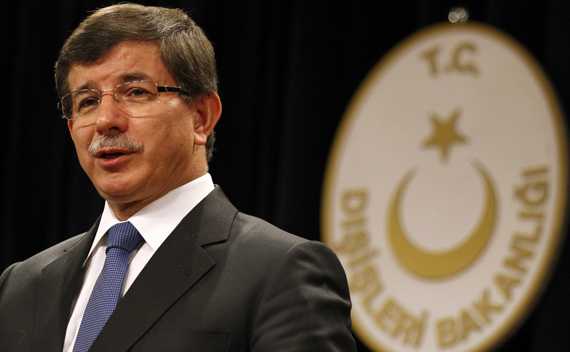by Steven Cook

Turkey’s Foreign Minister Ahmet Davutoglu talks to the media during a news conference in Ankara (Umit Bektas/Courtesy Reuters).
INSTANBUL — With the sharp deterioration of Turkish-Syrian relations over the last two days, some Turkish and Western observers have declared Ankara’s “zero-problems” foreign policy dead and buried. This sentiment has been building for some time, especially among critics of the ruling Justice and Development Party, but the denouement of the Erdogan/Davutoglu investment in Bashar al Assad—a signature policy—seems to have signaled the end of what has been billed as Turkey’s transformative diplomacy. The facts are hard to ignore. In an era when Ankara aspired to know problems with its neighbors, it actually has cok problems: Syria, Israel, Armenia, Iran, Cyprus, and the EU to name just a few.
To be fair, Ankara’s neighbors have not exactly cooperated, but at the same time, it is not all that much of a surprise that zero problems has not delivered as promised. For all of Foreign Minister Ahmet Davutoglu’s many talents, his signature policy was not all that visionary. In fact, it was downright conventional. Stripped of all the romance about Turkey being a role model, zero problems was based on the central hunch that drives economic determinism: If people are getting richer and happier, they will accept the status quo because they will develop an economic interest in said status quo, in turn, providing incentive to avoid any problems for fear it might undermine people’s newfound wealth and ipso facto, presto—zero problems.
In ways, this was a potentially genius way of dealing with Turkey’s Kurdish problem. Drop trade barriers, visa requirements, and invest in Syria and Iraq and the economic and political benefits to Turkey’s southeast would be enormous. By making Kurds richer and happier, Davutoglu assumed they would be less inclined to make cultural and national demands on the Turkish state. It hasn’t exactly worked out that way. Regionally, the weakness at the heart of zero problems was that it had no commitment to any particular kind of government. As a result, it was bound up in the Middle East’s old political order.
While AKP was driving democratic changes at home, the prime minister and foreign minister were courting nasty Middle Eastern leaders. Assad, to take an example, is the opposite of Erdogan. The Turkish prime minister owes his power and success to an appealing vision for Turkish society, the ability to deliver socio-economic benefits to Turks, and a whole lot of charisma. These factors have consistently returned him to office with ever-larger percentages of the popular vote. The Syrian president is the son of a brutal dictator who remains in power through his willingness to spill the blood of his own people. The same stunning irony was clear in Turkey’s relations with Qadhafi’s Libya. Once these regimes faltered, which, again in all fairness to Ankara hardly seemed inevitable, zero problems was likely to look like a bad bet. Once the game was up, revealing Turkey to be no different from any other major power in the region all too willing to do business with unseemly characters, Erdogan and Davutoglu were forced to tack hard against their own policies. Zero problems is now dead because it became unsustainable as Qadhafi massed forces against Tripoli or Bashar al Assad cranks up the violence to save his regime.
The combination of deft public relations, the help of some parts of the national press all too willing to engage in national self-aggrandizement, and an emerging consensus among international foreign policy elites about the benefits of the “Turkish model,” has rescued the AKP’s foreign policy from the gap between Ankara’s principles and its actual conduct in the region. There are exceptions to this, of course. Erdogan has been consistent in his position on Gaza, which has won him widespread admiration in the Arab world. Still, for those who bother to look critically, zero problems and its demise reveal that like the United States, the EU, and other global powers, Turkey only became a champion of human rights and democracy in the Middle East world after Arabs took matters into their own hands and began bringing down Ankara’s friends.
via Steven A. Cook: From the Potomac to the Euphrates » Turkey: From Zero Problems to Cok Problems.